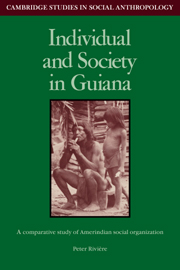Book contents
- Frontmatter
- Contents
- Acknowledgments
- 1 Peoples and approaches
- 2 The settlement pattern: size, duration, and distribution
- 3 Village composition
- 4 The categories of social classification
- 5 Aspects of social relationships
- 6 Autonomy and dependency
- 7 The individual in society
- 8 Guiana society and the wider context
- Notes
- Bibliography
- Index
- CAMBRIDGE STUDIES IN SOCIAL ANTHROPOLOGY
5 - Aspects of social relationships
Published online by Cambridge University Press: 01 October 2009
- Frontmatter
- Contents
- Acknowledgments
- 1 Peoples and approaches
- 2 The settlement pattern: size, duration, and distribution
- 3 Village composition
- 4 The categories of social classification
- 5 Aspects of social relationships
- 6 Autonomy and dependency
- 7 The individual in society
- 8 Guiana society and the wider context
- Notes
- Bibliography
- Index
- CAMBRIDGE STUDIES IN SOCIAL ANTHROPOLOGY
Summary
In the last chapter we were concerned with the classification of people and with the rules including those relating to marriage, that underlie it. Here we attempt to flesh out these terminologies and rules and to understand what they mean in the interaction of everyday life. In doing so we must remember that the social circles in which daily transactions take place are extremely small, and contain, if not always in practice at least notionally, closely related individuals. We will initially go along with this fiction, but later in the chapter it will be necessary to examine how increasing physical and social distance (insofar as they are separable) influences the contents of the various relationships.
In the inspection of the relationship terminologies certain features emerged as important in their ordering. These were genealogical level, relative age, sex, and affinity. For the purpose of this present chapter it is initially necessary to break down the last feature into four analytically distinguishable relationships: marital, marriageability, affinity, and affinability. Definitions of these terms will be provided at the appropriate places in the text.
In the first part of this chapter we will examine the behavioral correlates of age, sex, and genealogical level; in the second part the focus is on affinity and its four distinguishable aspects; and in the third part some general remarks are made about the nature of affinity in the region.
- Type
- Chapter
- Information
- Individual and Society in GuianaA Comparative Study of Amerindian Social Organisation, pp. 54 - 71Publisher: Cambridge University PressPrint publication year: 1984



